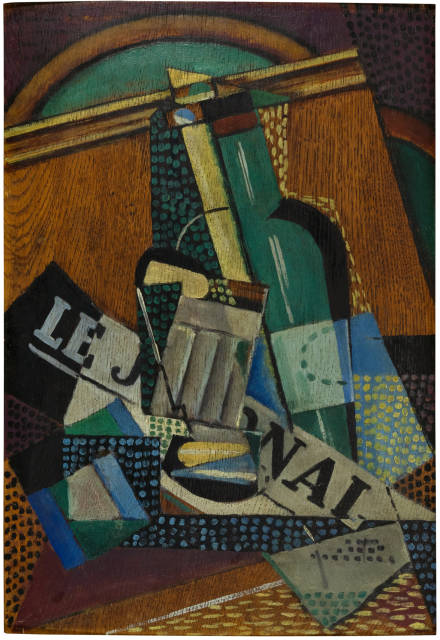- FR
S’inscrire
- Ventes Classiques
- Ventes passées
- Plus
- Acheter
- Vendre
- Plus
- Galerie
- Commerce d'art
- Maison d'Édition
- Kornfeld aujourd’hui
- L'histoire de la Maison
- Informations








1915
Oil on wood
42.5x28.5 cm
Signed and dated in ink by the artist in the upper left within a partially erased dedication "A mon ami M... / Avec mes amitiés / Juan Gris / 12-15"
Douglas Cooper, Juan Gris, Catalogue raisonné de l'œuvre peint, Paris 1977, no. 154
Gift of the artist to
Jean Metzinger Collection, Paris
Galerie Louise Leiris, Paris (inv. no. 14963, photo no. 11084), purchased there by
The Eberhard W. Kornfeld Collection, Bern, with the collector's stamp on the reverse, Lugt 913b
Paris 1974, Musée de l'Orangerie, Juan Gris, cat. no. 39, ill.
Davos 1998-1999, Kirchner Museum, Werke aus der Sammlung Eberhard W. Kornfeld, cat. no. 16, ill.
Vienna 2008/2009, Albertina, Wege der Moderne, Aus der Sammlung Eberhard W. Kornfeld, cat. no. 33, p. 287, ill. p. 64
Wood slightly curved. With slight abrasions in the upper edge of the image. Fresh in colour
Together with Pablo Picasso and Georges Braque, the Spanish painter Juan Gris was part of the core group of classical Cubism in Paris. From 1908, he lived in the Bateau-Lavoir, where he moved into a studio near Picasso. The two artists were close friends and cultivated a lively artistic exchange. At the time, they were fascinated by African art and visited the Musée dʼEthnographie du Trocadéro, among other places. This interest gradually developed into Cubist thinking, which ultimately led to the emergence of Cubism as a style-defining art movement - generally regarded as the beginning of classical modernism. From 1913 onwards, Gris created works in the spirit of "synthetic cubism". Elements such as newspapers, wallpaper, bottles, playing cards and musical instruments were rearranged and composed into paintings.
"Le Journal" is based on the construction of surfaces with a strict geometry and focuses on the reduction of colour to a few tones. Painted in 1915, the then 28-year-old Gris created a characteristic and attractive pictorial composition. In keeping with the Cubist maxim, he used everyday pictorial elements such as a newspaper, a bottle, a glass, but also a tabletop with imitation wood grain and pieces of fabric or patterned wallpaper to create a striking whole. The present still life symbolises the painter's mature creative period and is a testament to his innovative spirit and artistic mastery.
1915
Öl auf Holz
42,5x28,5 cm
Oben links im Rahmen einer teilweise gelöschten Dedikation vom Künstler in Tusche signiert und datiert "A mon ami M... / Avec mes amitiés / Juan Gris / 12-15"
Douglas Cooper, Juan Gris, Catalogue raisonné de l’œuvre peint, Paris 1977,
Geschenk des Künstlers an
Slg. Jean Metzinger, Paris
Galerie Louise Leiris, Paris (Inv.-Nr. 14963, Photo Nr. 11084), dort angekauft von
Slg. Eberhard W. Kornfeld, Bern, rückseitig mit dem Sammlerstempel, Lugt 913b
Paris 1974, Musée de l’Orangerie, Juan Gris,
Davos 1998-1999, Kirchner Museum, Werke aus der Sammlung Eberhard W. Kornfeld,
Wien 2008/2009, Albertina, Wege der Moderne, Aus der Sammlung Eberhard W. Kornfeld,
Bildträger leicht gewölbt. Mit leichten Abreibungen am oberen Bildrand. In farbfrischer Erhaltung
Der spanische Maler Juan Gris zählt zusammen mit Pablo Picasso und Georges Braque zur Kerngruppe des klassischen Kubismus in Paris. Seit 1908 lebte er im Bateau-Lavoir, wo er ein Atelier in der Nähe von Picasso bezog. Die beiden Künstler waren eng befreundet und pflegten einen regen künstlerischen Austausch. Sie waren damals fasziniert von afrikanischer Kunst und besuchten unter anderem etwa das "Musée dʼEthnographie du Trocadéro". Aus dieser Beschäftigung heraus entwickelte sich sukzessive das kubistische Denken, was schliesslich zur Entstehung des Kubismus als stilprägende Kunstrichtung – die gemeinhin als der Beginn der klassischen Moderne angesehen wird – führte. Ab 1913 schuf Gris Werke im Sinne des "synthetischen Kubismus". Elemente wie Zeitungspapier, Tapeten, Flaschen, Spielkarten oder Musikinstrumente wurden in den Werken in neuer Anordnung zum Gemälde komponiert.
"Le Journal" beruht auf der Flächenkonstruktion mit einer strengen Geometrie und ist auf die Reduktion der Farbe auf wenige sparsame Töne ausgerichtet. Der damals 28-jährige Gris hat 1915 mit diesem Werk eine charakteristische und attraktive Bildkomposition geschaffen. Er verarbeitete, ganz im Sinn der kubistischen Maxime, alltägliche Bildelemente wie eine Zeitung, eine Flasche, ein Glas, aber auch eine Tischplatte mit imitierter Holzmaserung sowie Teile von textilen Stoffen bzw. gemusterten Tapeten zu einem eindrücklichen Ganzen. Das vorliegende Stillleben steht für die reife Schaffenszeit des Malers und ist Beweis für seinen innovativen Geist und seine künstlerische Meisterschaft.
| Suisse | CHF | 150 |
| Europe | CHF | 250 |
| Outre-mer | CHF | 320 |









